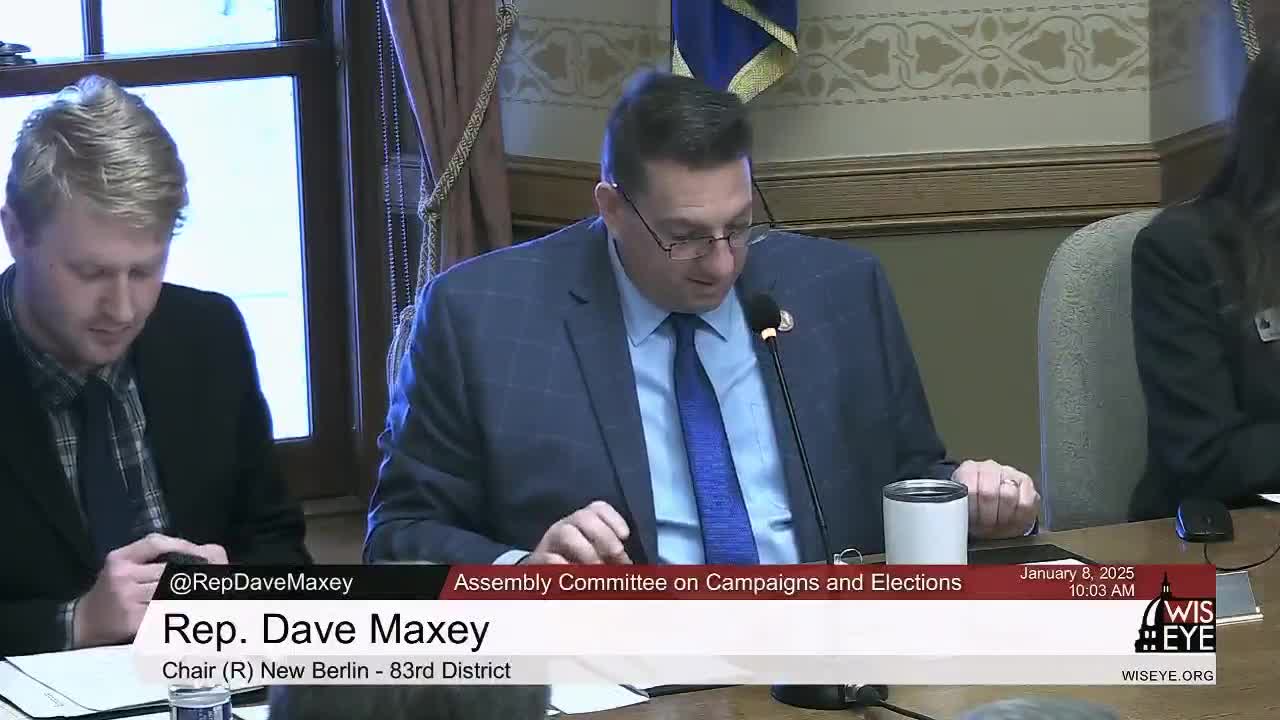Assembly committee holds hearing on constitutional amendment to require photo ID for voters
Get AI-powered insights, summaries, and transcripts
Subscribe
Summary
MADISON — The Assembly Campaigns and Elections Committee held a public hearing on Assembly Joint Resolution 1, a proposal to amend the Wisconsin Constitution to require valid photographic identification to vote, the committee announced at the start of the session.
MADISON — The Assembly Campaigns and Elections Committee held a public hearing on Assembly Joint Resolution 1, a proposal to amend the Wisconsin Constitution to require valid photographic identification to vote, the committee announced at the start of the session. Representative Snyder, who authored the measure, said the amendment is intended to "ensure that the people of Wisconsin have full confidence in the security and integrity of Wisconsin's elections." The proposal would place the voter-ID requirement in the state constitution; if adopted by two successive legislatures and ratified by voters it would appear on the April 2025 ballot.
The measure's proponents told the committee enshrining the requirement would protect public confidence and guard against voter impersonation, which they described as a real — if rare — threat. Opponents, including voting-rights advocates, municipal election officials and disability-rights groups, said the requirement already exists in statute and that changing the constitution risks making access harder for some eligible voters.
Representative Snyder testified that Wisconsin's existing voter ID law has been "widely successful in preserving election integrity and, ensuring that citizens are confident that their ballots cast are legitimate," and he urged lawmakers to "let the people decide" by placing the amendment on the statewide ballot. He noted the amendment would not remove existing statutory exceptions and said qualified electors who lack ID on Election Day could still cast provisional ballots under current law.
Witnesses opposing the amendment outlined specific problems they said remain under current law and would be difficult to resolve if the requirement is constitutionalized. Deborah Kron Miller, executive director of the League of Women Voters of Wisconsin, said the league opposes moving the statutory voter-ID requirement into the constitution because it "places a heavier burden on certain groups of citizens, including those who are disabled, elderly, or low income," and urged the committee to focus on making registration and voting more accessible and better funded.
Sam Leibert, Wisconsin state director for All Voting Is Local Action and a former municipal clerk, urged the committee to pursue administrative fixes that he said would boost confidence and reduce delays — for example, allowing absentee ballots to be processed before Election Day — rather than enshrining voter ID in the constitution. Leibert said studies of the 2016 implementation linked the law to declines in turnout in some places and that the effect fell disproportionately on communities of color.
Disability Rights Wisconsin testified about mobility, facility and documentation barriers that can make getting a photo ID difficult for people with disabilities. Their witness told the committee that 11 DMV service centers in the state are "not fully accessible" and said transportation gaps, ADA access problems and the time and cost of obtaining underlying documents can be significant barriers. The witness suggested mobile or off-site DMV services and technology updates as potential remedies but said those would require funding.
Nick Ramos, executive director of the Wisconsin Democracy Campaign, argued the hearing was unnecessary because the voter-ID requirement already exists in statute and said moving it into the constitution risks hardening policy that, in his view, has disenfranchised voters. He urged lawmakers to "vote no on this resolution" and to pursue bipartisan reforms to make elections more accessible.
Committee members pressed both sides on specifics. Some members asked whether voter ID has reduced turnout; proponents said turnout has not fallen and characterized the amendment as a way to protect against court challenges or future statutory changes. Opponents and some clerks and clerks-turned-witnesses described on-the-ground problems: people unable to secure underlying documents, limited DMV hours, inaccessible DMV buildings, and inconsistent provisional-ballot practices and follow-up (curing) across municipalities.
Several witnesses and legislators discussed existing statute and administrative practices: the 2011 voter-ID law (Act 43) and the availability of provisional ballots that can be cured through the Friday after the election, and they debated whether those existing mechanisms adequately protect both access and integrity. Witnesses said some voters are not offered provisional ballots and that clerks do not always consistently upload provisional-ballot information needed to assist voters in curing ballots.
No formal committee vote was taken at the public hearing. The committee chair said an executive session on the measure was scheduled for the following day. Representative Snyder noted the amendment would require approval by a second successive legislature and then voter ratification before taking effect.
The hearing drew representatives of nonprofit voting-rights groups, civic organizations, and individual residents. Testimony ranged from calls to preserve the statute by writing it into the constitution to requests for further work on DMV accessibility, funding for election administration and clearer guidance to local election officials.
The committee concluded the public testimony portion of the hearing and announced an executive session would be held the next day in the same room.
